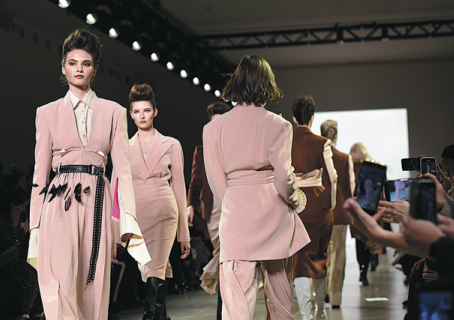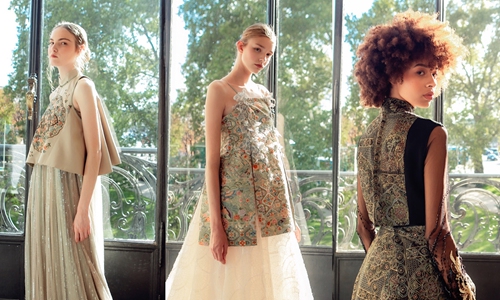
From the People's Daily App.
This is Story in the Story.
Amid the worldwide COVID-19 pandemic, most fashion shows and related activities were suspended, except this year’s New York Fashion Week.
Some haute couture shops have been hit hard by the pandemic because customers need to try on clothes first before purchasing, and few factories have resumed work.
Many models have not been able to work since the end of 2019 and have had to turn to other industries.
Chinese designer Wang Tao was one of the few representatives of China's fashion industry who released a new collection at the 2020 New York Fashion Week.
Because of the COVID-19 pandemic, it wasn’t easy for Wang to assemble a temporary team to prepare for the runway show and transport clothes and accessories from Shanghai to New York
"I wanted to show the world that we Chinese always keep our promises and will never give up,” Wang said.
Today’s Story in the Story looks at Chinese fashion designers and how they have continued to impact the fashion industry amid the coronavirus outbreak.

Models show Wang Tao's creations at the New York Fashion Week. (Photo: Xinhua)
Instead of a designer, Zhang Yan, 25, who made his New York fashion week debut in 2019, prefers to call himself a tailor, because, in his view, tailoring requires more talent and skill.
"I attained the level of a designer several years ago, but I am still not a tailor yet. I am still working on becoming a brilliant Chinese tailor," he said.
According to Zhang, compared to the foreign ready-made garment industry that mainly focuses on the appearance of clothing, Chinese tailors tend to observe the emotions and mental state of the wearers before designing and tailoring their clothing.
Zhang noted that Chinese clothing culture focuses more on whether clothing can show the wearer's spirit and energy, so tailors need to have rich experience to understand both human beings and clothing accurately.
As a tailor, patience is just as important as talent because it usually takes more than 50 days to complete a single embroidered work, Zhang noted.
On the way to become an eligible and experienced Chinese tailor, Zhang created embroidery works that earned him an invitation to 2019 New York Fashion Week.
It was an opportunity to show off his original works at an international fashion platform and also a type of recognition of his design style and the core concepts of Chinese philosophy.
Zhang says that China's Taoist philosophy is one of his core design concepts.
"Taoism teaches us to be free and unfettered and avoid the restraints of the trifles of daily life. This is exactly what I want to convey through my clothing."

Courtesy of Zhang Yan (Photo: Global Times)
Once he watched a fashion show for an international brand on TV and surprisingly found that haute couture was so elegant and splendid that he couldn't look away. It was then and there that he thought about making designing his career.
However, his parents firmly opposed him taking on what they saw as a "woman's job," which they felt had no future potential.
Not knowing where to begin, he ended up going to college for stage art. However, he never gave up on his dream. He eventually began learning about different types of embroidery from various artists.
Starting his business without the support of his parents, Zhang spent nearly $422 to rent a house where he would work, making traditional clothing like qipao, also known as cheongsam.
"I wanted to give up almost every day at that time due to financial difficulties," he said.
One of those people was the chairman of China's Qipao Association, who ordered 40 sets and paid for everything ahead of time.
With the help of these people, Zhang continued to improve his skills. He found inspiration in Chinese ancient books such as the Classic of Mountains and Seas, a Chinese compilation of mythical geography and beasts, and ancient murals such as those at the Mogao Grottoes in Dunhuang, Northwest China's Gansu Province.
His experience has helped to break stereotypes about men in needlework and high fashion in China.
"My work has not been affected too much because last year's orders will not be completed until May, but the entire fashion industry is under attack," Zhang said.
Zhang said that when the pandemic ends, he will continue to attend more fashion shows and broaden his presence in the international market.
"I will open brick and mortar stores abroad to allow more foreign customers to experience Chinese clothing culture directly," he said.
(Produced by Nancy Yan Xu, Lance Crayon, Brian Lowe and Da Hang. Music by bensound.com. Text from Xinhua and China Daily.)


